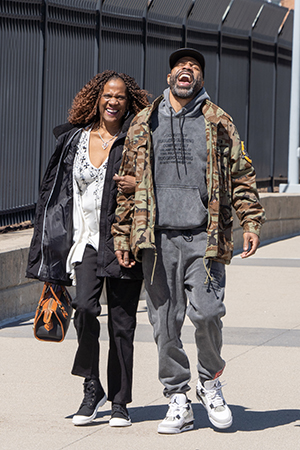Lung Cancer Screening Program
Lung cancer screening has shown that we can detect cancer much earlier in people most at risk.

Receiving a cancer diagnosis can be frightening for anyone. But for people who have lost many loved ones to the disease, the diagnosis can strike terror and suggest a death sentence. For 69-year-old Doretta Bradley, a retired machine operator, early detection of lung cancer would change her outlook and inspire others.
“I didn’t have any symptoms for lung cancer. I thought I was just my age that was making me slower and lose stamina,” says Doretta who had been a smoker for 40 years.
Eight friends and family members had died of cancer, and life had taken a lonely turn, says Doretta who lives alone on the westside of Detroit. She spends time playing solitaire and other games, enjoying soul food and taking walks along the Detroit River. “I went by myself this summer and had a wonderful time,” says Doretta.
When Doretta had a COVID test, her physician also ordered a chest X-ray.
The image showed a mass on her lung. After she recovered from COVID, CT scans and PET scans were done. Within a short time, the nodule on her lung grew. More images were taken, and a biopsy was done. Then Doretta received a diagnosis.
“You hear cancer, and you automatically think death,” says Doretta. Her four adult sons were alarmed, and Doretta couldn’t forget her sister’s poor quality of life after receiving an advanced-stage cancer diagnosis and treatment that was too late.
But hope came from thoracic surgeon Andrew Popoff, M.D. He explained the disease was in the early stage, and he believed all the cancer could be removed during surgery.
“Tell me that again!” recalls Doretta saying to Dr. Popoff. She was thrilled to learn that chemotherapy or radiation therapy may not be needed.
Yet her biggest challenge was staying strong. “I could not let my mind go places that worried me,” says Doretta. “I believe in prayer and that God would give me the strength to handle anything coming my way.”
Lung cancer screening has shown that we can detect cancer much earlier in people most at risk.

The biggest advancement in lung cancer surgery has been minimally invasive surgery for tumor removal. Dr. Andrew Popoff, Thoracic Surgeon at Henry Ford Cancer discusses the benefits of minimally invasive procedures for lung cancer patients.
 Two weeks later, Dr. Popoff removed the cancer using minimally invasive thoracoscopy. “We removed a segment of the lobe where the tumor lived, and we did it all with a camera and small instruments,” says Dr. Popoff. “There’s less post-operative pain, a shorter hospital stay, and an earlier return to normal activity. We try to minimize the impact of the surgery, and we find it’s a great approach when it’s appropriate for our patients.”
Two weeks later, Dr. Popoff removed the cancer using minimally invasive thoracoscopy. “We removed a segment of the lobe where the tumor lived, and we did it all with a camera and small instruments,” says Dr. Popoff. “There’s less post-operative pain, a shorter hospital stay, and an earlier return to normal activity. We try to minimize the impact of the surgery, and we find it’s a great approach when it’s appropriate for our patients.”
“Ms. Bradley’s story is about finding cancer at a treatable stage, even in someone with a lot of medical comorbidities. She’s had a previous heart attack and coronary stents. She also has multiple sclerosis and COPD,” says Dr. Popoff. “There are still treatment options for such patients.”
“I was ecstatic that the cancer was not in my lymph nodes,” says Doretta. “No other treatment was needed because they caught it early. You don’t hear that often. The doctors were straightforward with me. They were attentive and listened to what I was saying. And I loved the two doctors named Eric. Bless their hearts!” says Doretta, referring to the residents Eric Lisznyai, M.D. and Erik Schwarze, M.D.
“Also, I was surprised by my comeback after the surgery,” says Doretta who participated long ago in a pre-nursing program at Henry Ford. “I had a recent chest x-ray, and Dr. Popoff’s office called to say it looks better than expected.”
“What’s unique about her is that she was motivated to quit smoking. We felt like she was someone we could help,” says Dr. Popoff, a strong advocate of lung cancer screening.
People eligible for lung cancer screening include those between the ages of 50 – 77 who have a 20-pack-year smoking history, those who currently smoke and those who have quit in the past 15 years. They can receive low-dose CT scans for three sequential years.
“Lung cancer kills more people than breast, colon and prostate cancer combined,” says Dr. Popoff. “If we could get lung cancer screening rates to where they are for colon cancer, we would have thousands and thousands of treatable lung cancers. That’s a huge impact on the disease.”
Doretta offers three nuggets of advice. For patients: If you have a cancer diagnosis, it doesn’t mean it’s a death sentence. For smokers: Get an early detection test for cancer and follow your doctor’s advice. And for young people and loved ones: Continue the traditions of family gatherings, talk and care for each other.
Her future? “I want to get more involved with life again,” says Doretta. “I am blessed – I am Henry.
We use cookies to improve your website experience. By using this site, you agree to our Terms of Use. Read our Internet Privacy Statement to learn what information we collect and how we use it.